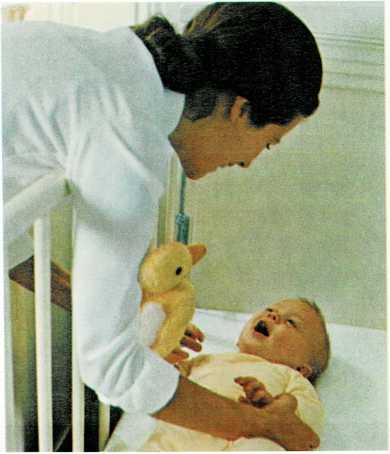You and your baby
The coming of a baby into a home is bound to cause a certain amount of
conflict. From time to time, mixed feelings are aroused in parents as
well as in brothers and sisters.
Most fathers of first babies have their moments of wondering if their
wives will be as considerate and understanding as they were before the
baby’s arrival. New mothers have their bad times, too, when they feel
resentful or depressed about being so “tied down”—or about what seems
to them lack of consideration from their husbands. When you are tired,
everything is harder to do, especially taking care of the new baby. So
try to get as much rest as possible. Take advantage of the baby’s
nap-time to take care of yourself. Fathers who help with night feedings
can make the first few months more tolerable for everyone. And if
Bedtime should be a happy time—a time for lullabies and talking.

the new baby is not a first one, the children in the family will
inevitably feel, on occasion, that life was better before the baby came.
These feelings are universal. They are nothing to be ashamed of.
The relationship between father, mother, and the baby is very important.
The baby learns and develops skills, to a considerable degree, in
response to the stimulation and love provided by you, his or her
parents. You in turn, become sensitive to your baby’s needs—both
physical and emotional. Only then can you respond to them appropriately.
Every baby develops a different relationship with his parents, different
from any other set of parents and child. Even children in the same
family react differently to their parents, because no two babies enter
the same family. Each child should be viewed as an individual. It often
is necessary to modify an approach which has been successful in dealing
with one child in the family, when the same situation comes up with
another child. Certainly, what works for a neighbor may not be
appropriate for you.
Magazines, television programs, and books are full of general advice for
parents. What is more important is the development of confidence in
your abilities to deal with your child. Despite all the advice and
pressures, you are still the one responsible and the one best able to
solve day-to-day problems. Try to anticipate the needs of your children.
Meet the needs with love, not overprotection. And help provide the
environment for each child to grow and develop to his or her full
potential.

